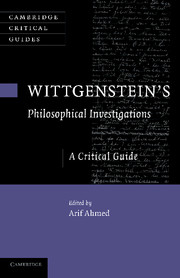Book contents
- Frontmatter
- Contents
- List of contributors
- Acknowledgments
- Introduction
- 1 From referentialism to human action: the Augustinian theory of language
- 2 What's doing? Activity, naming and Wittgenstein's response to Augustine
- 3 Measure for measure? Wittgenstein on language-game criteria and the Paris standard metre bar
- 4 Wittgenstein on family resemblance concepts
- 5 Wittgenstein on concepts
- 6 Wittgenstein vs contextualism
- 7 Wittgenstein and the linguistic turn
- 8 Rorty's Wittgenstein
- 9 Are meaning, understanding, etc. definite states?
- 10 Another strand in the private language argument
- 11 Deductive inference and aspect perception
- 12 Remembering intentions
- Bibliography
- Index
2 - What's doing? Activity, naming and Wittgenstein's response to Augustine
Published online by Cambridge University Press: 06 July 2010
- Frontmatter
- Contents
- List of contributors
- Acknowledgments
- Introduction
- 1 From referentialism to human action: the Augustinian theory of language
- 2 What's doing? Activity, naming and Wittgenstein's response to Augustine
- 3 Measure for measure? Wittgenstein on language-game criteria and the Paris standard metre bar
- 4 Wittgenstein on family resemblance concepts
- 5 Wittgenstein on concepts
- 6 Wittgenstein vs contextualism
- 7 Wittgenstein and the linguistic turn
- 8 Rorty's Wittgenstein
- 9 Are meaning, understanding, etc. definite states?
- 10 Another strand in the private language argument
- 11 Deductive inference and aspect perception
- 12 Remembering intentions
- Bibliography
- Index
Summary
A DILEMMA
Activity is central to Wittgenstein's account of meaning, whether or not that account is a theory, description, therapy or, simply, an investigation. But what kind of activity plays this foundational role – Im Anfang war die Tat? Philosophical Investigations describes many activities: buying apples, fetching building blocks, referring to objects, naming, continuing a series and, of course, learning how to continue a series, learning the meaning of a word. My primary focus in this essay is on learning. When I ask ‘What's doing?’, what I'm interested in is the activity that makes someone a language learner. What must we be able to do in order to be language learners?
If the activities that figure in Wittgenstein's descriptions of language learning are the activities of meaningful language use there will be no interesting explanatory answer to the above question. The activities of the language learner will be activities that already place them within the practice of language use. The learner's activities will not provide an entry into language, for they presuppose linguistic competence. Alternatively, for any account of activities that characterize a language learner where those activities fall outwith the practice of meaningful language use, it is tempting to think that an insurmountable bootstrapping problem faces any attempt to show how, on the basis of these rudimentary activities, one can explain entry into the full-blown intentional actions of concept-using subjects. This dilemma faces anyone trying to give an explanatory account of learning.
Keywords
- Type
- Chapter
- Information
- Wittgenstein's Philosophical InvestigationsA Critical Guide, pp. 30 - 48Publisher: Cambridge University PressPrint publication year: 2010
- 2
- Cited by

